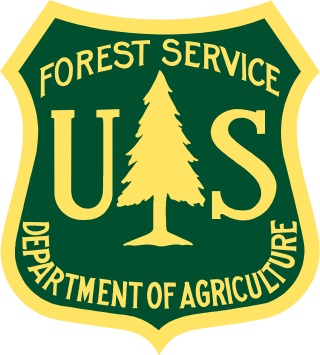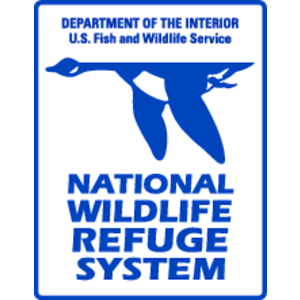Related Research Articles

The United States Forest Service (USFS) is an agency within the U.S. Department of Agriculture that administers the nation's 154 national forests and 20 national grasslands covering 193 million acres (780,000 km2) of land. The major divisions of the agency are the Chief's Office, National Forest System, State and Private Forestry, Business Operations, and Research and Development. The agency manages about 25% of federal lands and is the only major national land management agency not part of the U.S. Department of the Interior.

National Wildlife RefugeSystem (NWRS) is a system of protected areas of the United States managed by the United States Fish and Wildlife Service (FWS), an agency within the Department of the Interior. The National Wildlife Refuge System is the system of public lands and waters set aside to conserve America's fish, wildlife, and plants. Since President Theodore Roosevelt designated Florida's Pelican Island National Wildlife Refuge as the first wildlife refuge in 1903, the system has grown to over 568 national wildlife refuges and 38 wetland management districts encompassing about 856,000,000 acres (3,464,109 km2).
Natural Resources Conservation Service (NRCS), formerly known as the Soil Conservation Service (SCS), is an agency of the United States Department of Agriculture (USDA) that provides technical assistance to farmers and other private landowners and managers.

The Conservation Reserve Program (CRP) is a cost-share and rental payment program of the United States Department of Agriculture (USDA). Under the program, the government pays farmers to take certain agriculturally used croplands out of production and convert them to vegetative cover, such as cultivated or native bunchgrasses and grasslands, wildlife and pollinators food and shelter plantings, windbreak and shade trees, filter and buffer strips, grassed waterways, and riparian buffers. The purpose of the program is to reduce land erosion, improve water quality and effect wildlife benefits.

The Arizona Game and Fish Department is a state agency of Arizona, headquartered in Phoenix. The agency is tasked with conserving, enhancing, and restoring Arizona's diverse wildlife resources and habitats through protection and management programs.

The University of Florida Institute of Food and Agricultural Sciences (UF/IFAS) is a teaching, research and Extension scientific organization focused on agriculture and natural resources. It is a partnership of federal, state, and county governments that includes an Extension office in each of Florida's 67 counties, 12 off-campus research and education centers, five demonstration units, the University of Florida College of Agricultural and Life Sciences, three 4-H camps, portions of the UF College of Veterinary Medicine, the Florida Sea Grant program, the Emerging Pathogens Institute, the UF Water Institute and the UF Genetics Institute.
The Wetlands Reserve Program (WRP) was a voluntary program offering landowners the opportunity to protect, restore, and enhance wetlands on their property. The USDA Natural Resources Conservation Service (NRCS) administers the program with funding from the Commodity Credit Corporation.

The Florida Department of Environmental Protection (FDEP) is the Florida government agency responsible for environmental protection.

The Food, Conservation, and Energy Act of 2008 was a $288 billion, five-year agricultural policy bill that was passed into law by the United States Congress on June 18, 2008. The bill was a continuation of the 2002 Farm Bill. It continues the United States' long history of agricultural subsidies as well as pursuing areas such as energy, conservation, nutrition, and rural development. Some specific initiatives in the bill include increases in Food Stamp benefits, increased support for the production of cellulosic ethanol, and money for the research of pests, diseases and other agricultural problems.

Agriculture is the largest employment sector in Bangladesh, making up 14.2 percent of Bangladesh's GDP in 2017 and employing about 42.7 percent of the workforce. The performance of this sector has an overwhelming impact on major macroeconomic objectives like employment generation, poverty alleviation, human resources development, food security, and other economic and social forces. A plurality of Bangladeshis earn their living from agriculture. Due to a number of factors, Bangladesh's labour-intensive agriculture has achieved steady increases in food grain production despite the often unfavorable weather conditions. These include better flood control and irrigation, a generally more efficient use of fertilisers, as well as the establishment of better distribution and rural credit networks.

Agriculture in Saudi Arabia is focused on the export of dates, dairy products, eggs, fish, poultry, fruits, vegetables, and flowers to markets around the world as it has achieved self-sufficiency in the production of such products. The government of Saudi Arabia is heavily involved in the agriculture industry and subsidizing corporate farming and the Ministry of Environment, Water and Agriculture is primarily responsible for the agricultural policies in the nation. The private sector also plays a role in the nation's agriculture, as the government offers long-term interest-free loans and low-cost water, fuel, electricity, and duty-free imports of raw materials and machinery.
In United States federal agriculture legislation, the Agricultural Management Assistance Program was authorized in the Agricultural Risk Protection Act of 2000 and permanently authorized and amended in the 2002 farm bill to provide mandatory funding of $20 million annually from FY2003 through FY 2007 and $10 million in all other years. Participants in 15 designated states, primarily in the northeast, that had been under-served by crop insurance are to receive financial assistance, not to exceed $50,000 per year, to help pay to install conservation practices and take other specified actions that will reduce their financial risk.

The Environmental Quality Incentives Program (EQIP) is a United States government program designed to assist farmers in improving environmental quality, particularly water quality and soil conservation. Congress established the program in the 1996 farm bill to provide primarily cost-sharing assistance, but also technical and educational assistance, aimed at promoting production and environmental quality, and optimizing environmental benefits.
Conservation of Private Grazing Lands — Enacted in the 1996 farm bill and most recently amended by the 2002 farm bill, this program provides coordinated technical, educational, and related assistance to preserve and enhance privately owned grazing lands. It authorizes the creation of two grazing management demonstration districts. Appropriations are authorized at $60 million annually from discretionary funds for FY2002 through FY2007.
Farm and Ranch Lands Protection Program (FRPP) — The Natural Resources Conservation Service (NRCS) renamed the Farmland Protection Program (FPP) to the Farm and Ranch Lands Protection Program in 2003 to accurately reflect the resources eligible to participate in the program. The program established by the 1996 farm bill to fund the purchase of conservation easements of 170,000-340,000 acres of land having prime or unique soil or other desirable production qualities that are threatened by urban development. Eligibility depends upon already having a pending offer from a state or local government to protect qualifying land by limiting nonagricultural use. The 2002 farm bill reauthorized the program through FY2007 and provided mandatory funding from the Commodity Credit Corporation (CCC) that was $50 million in FY2002 and will rise to $125 million in FY2004, then slowly decline to $97 million in FY2007. Other changes expanded the definition of eligible land to include cropland, rangeland, grassland, pasture land, incidental forest land, and historic and archeological sites; expanded the list of eligible participants to include Indian tribes and non profit organizations that meet specified qualifications; and directed an unspecified portion of the program funds to carry out a farm viability program. According to the NRCS FY2005 budget request document, more than 306,000 acres (1,240 km2) in 42 states have or soon will have easement contracts.
Small Watershed Rehabilitation Program – The Grain Standards and Warehouse Improvement Act of 2000 authorized cost-sharing to rehabilitate aging structural measures that are part of water resources projects. The 2002 farm bill authorizes mandatory funding from the Commodity Credit Corporation (CCC) of $45 million in FY2003, rising by $5 million each year through FY2007, and appropriations of $45 million in FY2003, increasing by $10 million each year through FY2007.
The McGovern-Dole International Food for Education and Child Nutrition Program (IFEP) is a food aid program authorized in the Farm Security and Rural Investment Act of 2002 which provides for the donation of U.S. agricultural commodities and associated financial and technical assistance to carry out preschool and school feeding programs in foreign countries. Maternal, infant, and child nutrition programs also are authorized under this program. It is named after former U.S. Senators George McGovern and Bob Dole, who advocated in the U.S. Congress for its passage.
The Great Lakes Basin Soil Erosion and Sediment Control Program is an American federal and multi-state environmental and agricultural program to water quality, land use, and agricultural productivity pertaining to the Great Lakes Basin. It was authorized by the Farm Security and Rural Investment Act of 2002. Under the program, $5 million is authorized annually in discretionary funds from FY2002 through FY2007 to implement new authority for a soil erosion and sediment control program in this basin that had been established in a number of prior enactments.
The Grassroots Source Water Protection Program, more commonly called the Source Water Protection Program, enacted in the 2002 farm bill, authorizes the appropriation of $5 million annually in discretionary funds from FY2002 through FY2007 to use the technical assistance capabilities of rural water associations that operate wellhead or groundwater protection programs.

The Department of National Park, Wildlife and Plant Conservation (DNP), Thai: กรมอุทยานแห่งชาติ สัตว์ป่า และพันธุ์พืช) is an agency of the Ministry of Natural Resources and Environment. Its headquarters are in Chatuchak District, Bangkok. Since February 2016 the director-general of the DNP has been Thanya Netithammakun. In FY2018 DNP's budget is 11,574 million baht.
References
![]() This article incorporates public domain material from Jasper Womach. Report for Congress: Agriculture: A Glossary of Terms, Programs, and Laws, 2005 Edition (PDF). Congressional Research Service.
This article incorporates public domain material from Jasper Womach. Report for Congress: Agriculture: A Glossary of Terms, Programs, and Laws, 2005 Edition (PDF). Congressional Research Service.